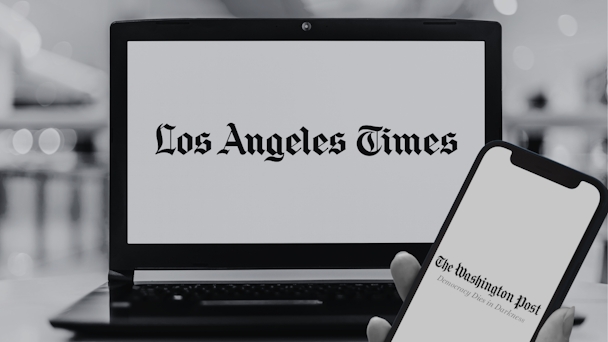LA Times & WaPo may suffer brand damage from refusals to endorse a presidential candidate
The Washington Post and Los Angeles Times broke with tradition by choosing not to endorse a candidate in the 2024 US presidential race, overriding planned support for Kamala Harris. As protest-driven resignations, union blowback and subscriber losses mount, PR and media experts analyze the fallout.

The Times and The Post are experiencing fallout after deciding to not endorse a presidential candidate. / Credit: The Drum
For the first time in decades, the Los Angeles Times and The Washington Post, two of the US’ most prominent newspapers, have chosen not to endorse a candidate in the 2024 presidential election.
The Washington Post had previously endorsed a candidate in every election since 1976, save for 1988. The LA Times, meanwhile, has backed a candidate in every cycle since 2008 – and has for years taken an editorial position staunchly opposed to former President Donald Trump.
The decisions not to endorse – both of which are believed to have been influenced by the papers’ billionaire owners – Dr Patrick Soon-Shiong at the LA Times and Jeff Bezos at The Washington Post – have caused a wave of both internal and external backlash.
Several senior staff members at both organizations have resigned in protest. At the LA Times, editorial page editor Mariel Garza, editorial writer Robert Greene and Pulitzer Prize-winning editorial writer Karin Klein all stepped down. Meanwhile, nearly a third of The Washington Post’s editorial board, including Pulitzer Prize-winning journalist David Hoffman and columnist Michele Norris, resigned.
Want to go deeper? Ask The Drum
The business impact has also been severe. The LA Times, which has fewer than 400,000 subscribers, has reportedly lost over 7,000 subscribers for “editorial reasons,” the paper reported Monday. Meanwhile, according to NPR, over 200,000 subscriptions have been canceled at The Washington Post since the decision.
Labor unions at both publications have also voiced their disapproval of the decisions to abstain from endorsement. In a statement, the LA Times Guild accused Dr Soon-Shiong of blocking the paper’s planned endorsement and shifting blame on to the editorial board.
A statement from Los Angeles Times Guild leadership: pic.twitter.com/IqetOqvdnZ
— L.A. Times Guild (@latguild) October 24, 2024
Similarly, The Washington Post Guild asserted that the decision “undercuts the work of [its] members at a time when [the company] should be building [its] readers’ trust, not losing it.”
A statement from Post Guild leadership on the Washington Post's decision to not endorse a presidential candidate pic.twitter.com/fYU7hkr79K — Washington Post Guild (@PostGuild) October 25, 2024
Navigating the headlines: A PR storm brews
Comms and PR experts are divided on whether the decision to withhold endorsements could lead to lasting reputational damage for the two news brands.
Some have shared damning assessments.
“The WaPo endorsement drama might be the biggest PR failure of the year, TBH,” said Chris Harihar, executive vice-president of PR at Mod Op, in a post on X.
The WaPo endorsement drama might be the biggest PR failure of the year, TBH. https://t.co/UuUYIMIxNv
— Chris Harihar (@ChrisHarihar) October 28, 2024
Speaking to The Drum, Harihar elaborates, saying: “These decisions should have been made months ago... Making them now, just days before the election, makes them seem reactive and defensive – as if responding to pressure, whether from a new editor, ownership, or external critics such as Trump, who has been vocal against legacy news publishers.”
Nonetheless, he notes that endorsements may not carry the same weight in today’s media environment – where public trust in journalism has eroded – as they once did. “Endorsements are relics. They’re holdovers from an era when the media enjoyed greater public trust,” he says.
The sentiment is echoed by other experts. “An endorsement would never influence this election,” says Mitchell Jackson, founder of BCC Communications. “People don’t vote based on endorsements from newspapers. Why do you think Trump and Kamala are so focused on YouTubers and podcasters? That’s where the audience is.”
And other PR professionals predict that the controversy will blow over quickly. “[This] will have little to no effect post-election, as news cycles quickly shift,” says Brenda Christensen, CEO of Stellar Public Relations. “Most outrage will be momentary and forgotten as coverage shifts to the election outcome.”
Advertisement
However, other industry leaders warn that the internal conflict between staff and ownership could have more lasting effects.
“There is a clearly defined split among the ownership of these papers and the staff, labor unions. Unfortunately, in a case like this, I think the damage has been done,” says David Triana, director of media relations at Axia Public Relations.
Now, consumers may have a diminished view of the papers, and what they stand for, Triana suggests. “Many people will now... believe these outlets now have a political agenda, solely because of how these decisions were made.”
But beyond questions of how the reputations of the LA Times and The Washington Post will be affected, a broader concern centers on whether these decisions reflect a more profound shift. Have the norms that dictate power dynamics in media and editorial independence changed?
In the view of Eric Yaverbaum, CEO of comms firm Ericho Communications, for instance, both organizations’ decisions to forgo an endorsement reflect the outsized influence of wealthy owners or investors.
As he puts it: “It isn’t a question of whether billionaires dictating American journalism will affect the reputations of longtime, respected publications such as The Washington Post and Los Angeles Times – it already has.”
And the ripple effect has perhaps not concluded yet. Yaverbaum “wouldn’t be surprised” if the sway of billionaire stakeholders “leads to decreased readership and damaged trust [in legacy media brands such as the LA Times and The Washington Post]... as well as increased competition from independent blogs, newsletters, podcasts and other media entities.”
In terms of brand image and reputation, the rush to block the endorsements at the 11th hour may have only made matters worse for the papers. “Both endorsements were hastily blocked at the last minute, worsening the already terrible optics,” Yaverbaum says. “It’s a move that sends a message not of impartiality but of a clear bias.”
Advertisement
Pressing forward: what’s next for the papers?
The fallout from these decisions will likely linger beyond election day. While some experts believe the damage is already done, others suggest paths for reputational recovery.
“Transparency and open dialogue are the only way these outlets can begin to mend the damage that’s been done by these decisions,” says Axia Public Relations’ Triana.
Christensen of Stellar Public Relations echoes the necessity for transparency and says that while the controversy will likely be short-lived, the fallout can be mitigated by proactive messaging. “Being transparent and openly communicative is the best way to effectively engage with any stakeholders or audience,” she says.
But it’s not a universally shared opinion. BCC Communications’ Jackson, for his part, argues that transparency alone won’t suffice for The Washington Post. He suggests that the paper advance its plans to hire conservative op-ed writers to broaden its perspectives and combat consumer perceptions about the organization’s bias.
Suggested newsletters for you
“The Washington Post has significant issues because they’ve lost subscribers. The reality is they built their business around ‘the resistance,’” he says, referring to a political movement that emerged in response to Donald Trump’s presidency. “They [probably] can’t win these people back, so the editor’s announcement that he’s hiring conservative op-ed writers is brilliant. They could be the New York Times for the middle, and that’s an opening.”
The Los Angeles Times faces its own unique challenge around brand identity, Jackson contends. In his words, “The LA Times has bigger problems than this... They have existential readership problems [and] they need to find a lane... The LA Times should focus less on politics. Politics is the business of DC. Hollywood is the business of LA.”
Ultimately, the lesson for both publications seems to be the need for a deliberate and thoughtful approach when breaking with long-standing traditions – particularly during politically charged moments.
In the words of Mod Op’s Harihar: “Making this decision in such a rushed way served no one and yielded no benefits ... during such a politically-charged moment. A more deliberate, thoughtful approach could have shown a meaningful response to changing perceptions of news. Instead, the rushed timing has only aggravated the trust crisis they’re trying to fix.”
For more, sign up for The Drum’s daily newsletter here.

